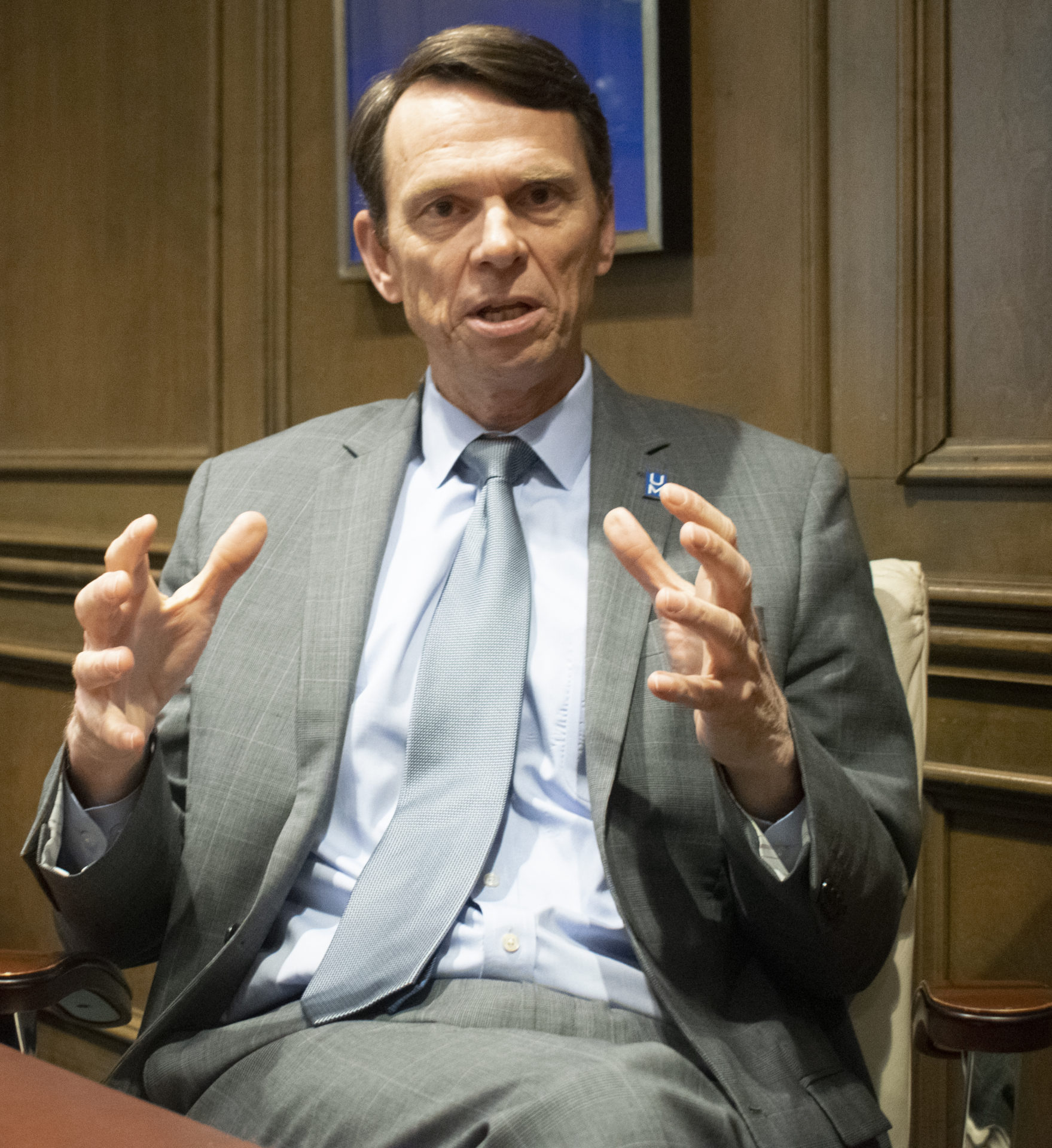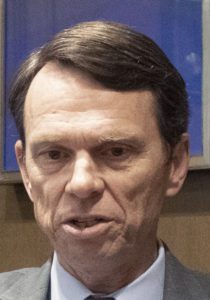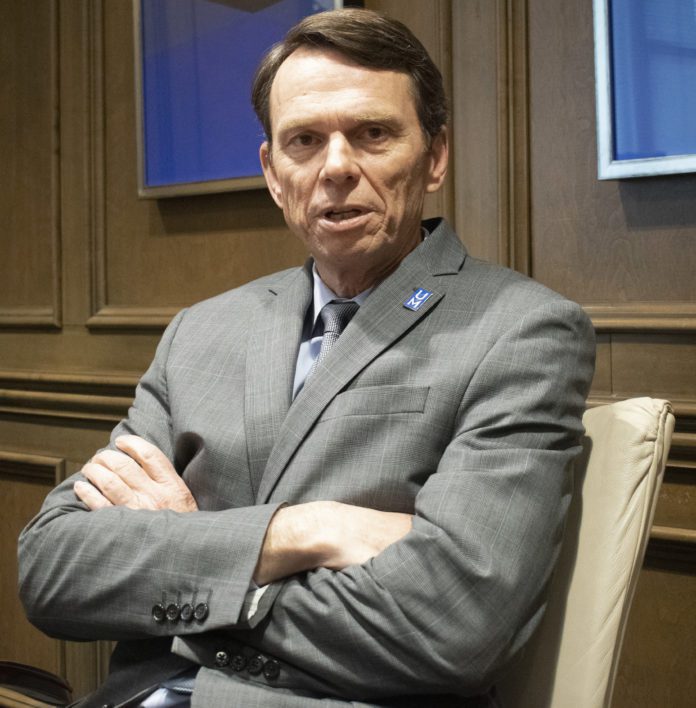A first-generation Arkansas high school student, who later discovered he could “make a difference,” Dr. William Hardgrave now is in charge of the University of Memphis, where he actively is embracing his latest opportunity to affect positive change.
The U of M’s 13th president, Hardgrave (former senior vice president for Academic Affairs at Auburn University), took over on April 1. On Tuesday, he welcomed a visit from The New Tri-State Defender as he makes his introduction to Greater Memphis.
In a conference room, three floors up in the Administration Building whose grounds feature the Memphis State Eight marker heralding the students who desegregated the university in 1959, Hardgrave fielded questions from TSD Associate Publisher/Executive Editor Karanja A. Ajanaku.
Karanja A. Ajanaku: How do you see yourself, as president, helping with the evolution of the relationship between the African American community and the U of M?
Dr. William Hardgrave: … Many universities, including the university that I just left, struggle to have a diverse student body, one that truly looks like America and this university looks like America. I think that’s a position of strength that this university ought to really take advantage of. And I’m not being critical, but I’m not sure we’ve fully taken advantage of that because employers want a diverse workforce and they want universities to turn out a diverse set of graduates to have a diverse workforce. And so that’s something that I’m just thrilled to inherit, a great diverse student body. …
I had lunch yesterday with Willie Gregory (of Nike). … And one of the pieces of advice he gave me was to make sure that I understand and continue to facilitate the great relationship between the University of Memphis and the Memphis community. … his point was well taken. And that is that there is such a great relationship here and we continue to have to work on that. … (W)e had some lunches, invited some of the community leaders in so that I got to know more about the community and (make) sure that I have touch points out there in the community.
K. Ajanaku: You talked (in other interviews) about learning in the process of your career about making a difference and that some aspect of that has shown each level that you’ve gone to. … (G)iven Memphis and its demographics and the fact that there’s only one HBCU … here, can more of a collaboration with LeMoyne-Owen College as a vehicle for making a difference?
Dr. Hardgrave: So, the short answer is yes, but I think it goes beyond that. I think it really goes to a collaboration among all the educational institutions at all levels. I had a meeting recently with the superintendent of the Shelby County Schools and one of the things that he and I talked about, and I think this is something we have to work on … what I call the educational ecosystem. …
We tend to view it, well, here’s K through 12, and here’s your community college, your two-year schools and here’s your four-year schools. And everybody kind of does their own thing and you work in silos. We’ve got to work together …
I’ll use myself as an example.… I grew up in rural Arkansas with no role models for what it looked like to even graduate high school. … My father was a construction worker. My mom worked in a shoe factory…. when we still had shoe factories in the US, so I didn’t know what it meant to go to college… I just was lucky that people were put in my path and I got to where I got to higher education…. Well, I’m the living embodiment of what higher education can do. And what we need to do from an ecosystem is make sure that everybody has that access and that opportunity. That they have role models that they can see…. And not everyone is destined to go to a four-year school, but we need to make sure that their destiny is fulfilled whatever path….

K. Ajanaku: Does the U of M share with school systems in Shelby County information about college readiness that can inform their planning and preparation of students?
Dr. Hardgrave: I don’t know if we do, but if we don’t, we will, because absolutely (the) question feeds right into this idea of the educational ecosystem. We need to know, they need to know how well prepared their students are for us. And we need to know that so that we can make sure we work with them to make sure those students are prepared. Or what we need to do to help prepare them. …
K. Ajanaku: … (R)elative to college readiness … generally speaking, are we seeing students more or less prepared when they come to the college level?
Dr. Hardgrave: Leading up to COVID I think we were generally seeing students more prepared. … Those whom we could get through graduation… we still have a bigger problem of them not making it to that high school graduation. But for those who graduated, we were seeing, I think, good improvement in many states who had struggled for a long time. COVID has hurt that and we’ve taken a pretty big step back in the students’ preparation. And unfortunately, that is going to hurt us for years. … It’s going to take us a very long time to recover from how the pandemic hurt education. … (A)cross the board, students are less prepared now than they were before the pandemic.
K. Ajanaku: You’ve mentioned ecosystem a couple of times. Can you amplify a little bit on what you’re talking about there?
Dr. Hardgrave: I’m talking about working together collectively as one unit… I’ll take Blue Oval City (the planned automotive assembly complex Ford Motor Company is spearheading in West Tennessee). … They’re going to be bringing thousands of jobs, but they’re going to need jobs of all types; some that require high school education only, some that require two-year technical school type training, some that require four-year degrees. Well, let’s work collectively and let’s work with Blue Oval City as they come in so that we have a better understanding of how we prepare our young people for the opportunities that lay ahead of them. … We need to be all on the same page. We need to be working together to help those young people all the way through, whatever that looks like.
K. Ajanaku: I’ve heard you say in your short time here that you had a lot of decisions that you have to make in the next year. Can you give us an idea of what might be at the top of that list?

Dr. Hardgrave: Well, I think at the top of the list is a preparation for what we know is coming with the demographics from a shared numbers perspective on students who are going to be college eligible or graduate from high school. Simply put, we will have fewer young people in a couple of years than we’ve had in decades. … We’re going to see a drop off of somewhere between 10 and 15 percent fewer high school graduates starting in 2025 over about a three to four year period of time. …
And these are not predictions, they’re projections, right, because we know how many babies were born. Tennessee is one of those states that’s going to get hit hard by that. … We’ve got to be proactive. …
One of the great things about this university is 83 percent of its students come from nearby within about a hundred miles. That’s fantastic, but it also puts us at risk. It makes us vulnerable to when we start seeing a decline across everywhere, other universities are going to come in and be much more aggressive about recruiting those students from our area…. (I)f we don’t have a solid plan in place and start executing toward that, we’re going to be in trouble.
K. Ajanaku: Let’s say that I was able to get a speaking engagement for you over at Melrose High School and they wanted you to talk about why this new (R1) research status (for the university) is important. … Why should it make a difference to them? What would you say?
Dr. Hardgrave: What this status means to us is it puts us on a different level for funding agencies, for example. Many of the research grants, you’re not eligible for those unless you have this R1 status. So, from a purely financial perspective, it opens doors. It doesn’t mean that money starts flowing in, but it gives us that access and opportunity to go after more funding. It means that we will attract new faculty to the university that we probably couldn’t have attracted before. …
Well, when you bring in great faculty who are doing great work and doing great research, now you’re on the cutting edge of thought that’s happening in the various fields and that makes the learning experience for the students just so much better…. (W)e’ve also struggled to recruit and retain faculty when we didn’t have that R1 status, so that will help set us apart. …
So, what I would tell the students is great faculty attract great students, and you want to be around other great students because it lifts everybody up. It also means that we have the ability to track more money. More money means more resources and the ability to do more things than we could have in the past.
K. Ajanaku: Relative to your … internal ecosystem, the university (last year) gave the United Campus Workers a baseline of $15 (per hour) and I believe the head of the United Campus Workers was a little surprised that it came at the time that it did. But she was hopeful that the campus workers would be involved more in ongoing processes. Can you see that happening?
Dr. Hardgrave: … I was so pleased to see that and certainly much needed…. One of the things we struggle with here is recruiting and retaining workforce. We’re not immune to the issues … facing most companies right now. And so, we have to make sure that we’re providing wages that make us competitive. …
As we go through and we work on a new strategic plan for this university, we will be very inclusive in the input that we get to develop that plan. We’re also going to be very inclusive about the staff being part of decisions and decision-making and having a seat at the table. And one of the things that we’ve already done is I’ve expanded what we call the president’s council to include members of the staff to sit on that council because I want to make sure that the staff’s voice is heard as well.
K. Ajanaku: Sticking on the ecosystem idea, in a way we’re talking about diversity and inclusion. You have to be able to administer that in such a way that you maintain control, but you allow the creativity. How do you see yourself in that role?
Dr. Hardgrave: One of the things that I’ve been telling the folks as I go around and meet with them is that I see my job primarily as president with two overarching purposes: one is to remove the hurdles that get in the way of somebody doing their job and to generate the resources that they need to effectively do their jobs. … I don’t know what those obstacles are. I don’t know what the resources are right now that we need to be effective, but what I’ve pledged to do – and what I’ve seen myself doing in every position that I’ve had – is in that role of reducing those hurdles. … There are new hurdles put in place every day and we just have to figure out a way to, sometimes can’t eliminate them, but we can lower those hurdles so that we can still get over them and get our job done.
And my vow is to let’s make sure that whatever those hurdles are, we clear them out, reduce them as much as we can, so people can get their job done, whether that’s a faculty member or … staff …working in the buildings to keep us safe and in a good place.
K. Ajanaku: Dr. Hardgrave, what have I not asked you that you would most like to answer?
Dr. Hardgrave: … A question that I get asked … is why did I come to the University of Memphis? I came here because I saw tremendous opportunity. Just as much as this university has improved over the last decade in particular, there’s so much more with this foundation that’s been laid that we can do and I see nothing but upside. … I’m looking forward to see if we can’t capitalize on all the great opportunities here.



